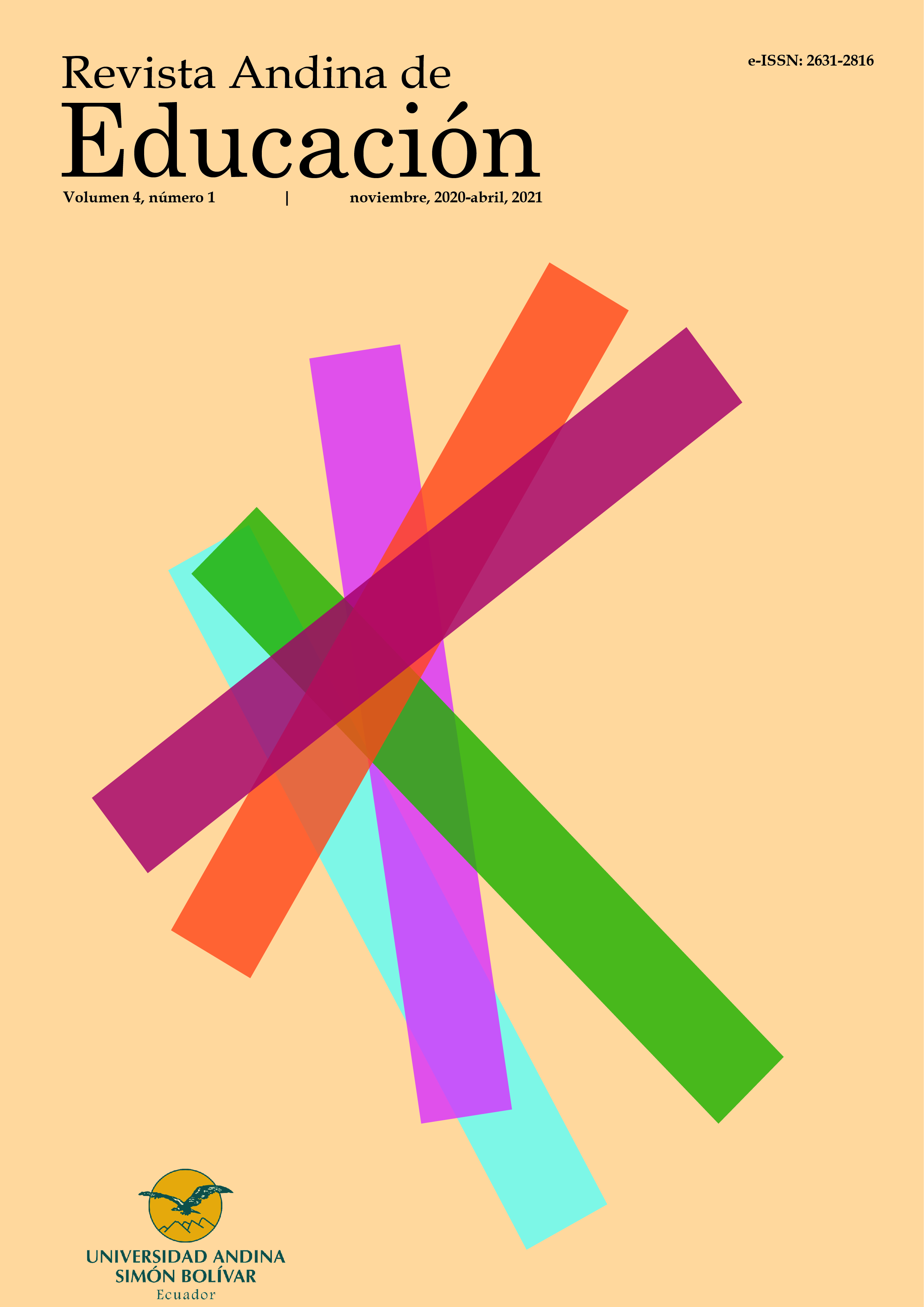El El liderazgo ético del docente universitario en la formación del ethos del futuro profesional en el contexto de la sociedad del Siglo XXI
Contenido principal del artículo
Resumen
La investigación tiene como objetivo analizar el liderazgo ético del docente universitario como eje fundamental en la formación del ethos del futuro profesional de la docencia en el contexto de la sociedad venezolana del siglo XXI, apoyando en su concepción y en el liderazgo ético del docente universitario en dicha estructuración. En lo metodológico, está enmarcada en una investigación documental, apoyada en un estudio teórico-reflexivo y analítico. Entre los resultados, destaca el hecho de que en las instituciones universitarias prevalece aún la formación de individuos competentes con una visión individualista, por lo que es necesario fomentar el desarrollo del ethos profesional basado en la justicia social, lo que permitirá una orientación formativa holística.
##plugins.themes.bootstrap3.displayStats.downloads##
Detalles del artículo
Sección
Los/as autores/as que publiquen en esta revista aceptan las siguientes condiciones:
1. Los/as autores/as conservan los derechos de autoría y ceden a la Revista Andina de Educación el derecho de la primera publicación, con el trabajo registrado con la licencia de atribución para uso no comercial de Creative Commons, que permite a terceros utilizar lo publicado siempre que mencionen la autoría del trabajo y a la primera publicación en esta revista.
2. Los/as autores/as pueden realizar otros acuerdos contractuales independientes y adicionales para la distribución no exclusiva de la versión del artículo publicado en esta revista (p. ej., incluirlo en un repositorio institucional o publicarlo en un libro) siempre que indiquen claramente que el trabajo se publicó por primera vez en la Revista Andina de Educación.
Cómo citar
Referencias
Arias, F. (2012). El proyecto de investigación, Introducción a la metodología científica. Caracas: Editorial Episteme.
Bavaresco, A. M. (2013). Proceso metodológico en la investigación (6ª ed.). Maracaibo: Imprenta Internacional.
Cadavid, P. (2015). Liderazgo ético, empatía y comportamientos socialmente responsables. México: Palo Alto.
Centro de documentación y análisis para los trabajadores [CENDAS] (2016). Informe socioeconómico. Realidad social de Venezuela. Caracas: Federación Venezolana de Maestros.
Colby, A. (2013). La formación práctica del estudiante universitario y los códigos deontológicos del ejercicio profesional. Barcelona: Herdes.
Cortina, A. (2000). Educación moral a través del ejercicio de la profesión. Diálogo filosófico. México: Trillas.
Coviello, A. (2006). Revolución ética en el recinto universitario. Caracas: Escuela de Humanidades, UCV.
Eiken, M. (2003). Parámetros de la ética para una buena convivencia ciudadana. Madrid: Geuz.
Finol, M. & Camacho, H. (2006). El proceso de investigación científica. Caracas: Ediluz.
Granell, E. Garaway, D. & Malpica, C. (1997). Éxito gerencial y cultura. Retos y oportunidades en Venezuela. Caracas: IESA.
Hodelin, H. (2014). Liderazgo ético y valores. ¿Por qué una ética profesional en nuestros tiempos? Buenos Aires: Emenece.
Hortal, A. (2002). Ética general de las profesiones. Bilbao: Desclée de Brouwer.
Hurtado, J. (2005). El proyecto de investigación. Metodología de la investigación holística. Bogotá: Sypal.
Ibarra, D. (2015). Ethos, ética y moral. Cuadernos para la discusión popular. Caracas: UBV.
Koontz, H, Weihrich, H. & Cannice, M. (2012). Administración. Una perspectiva global y empresarial. México: Mc Graw-Hill.
León, E. (2013). Venezuela. Los escombros de un legado. Material Mimeografiado. Caracas: Escuela de Sociología, UCV.
Lonergan, C. (1998). Ética, humanismo y sociedad postmoderna. Madrid: Morata.
López J. (2011). Educar al universitario de “ahorita”. Los desafíos de la formación ética de los universitarios mexicanos en la cultura individualista postmoderna. Sinéctica, 37, 1-16
López, R. (2013). Ética profesional en la formación universitaria. Perfiles educativos, 35(142), 15-24.
Lussier, R., & Achua, C. (2002). Liderazgo: Teoría, aplicación y desarrollo de habilidades. México: Thompson.
Martínez, M. (2000). La investigación cualitativa etnográfica en educación. Manual teórico-práctico. México: Trillas.
Morín, E. (2001). Los siete saberes necesarios para la educación del futuro. Buenos Aires: Paidós.
Organización Mundial de la Salud [OMS] (2002). Informe mundial sobre violencia y salud. Ginebra: OMS.
Peña, P. (2015). Venezuela: país de la inequidad. Yaracuy: Instivoc Ediciones.
Pérez, A. (2002). Educación para globalizar la esperanza y la solidaridad. Caracas: Estudios Fe y Alegría.
Reglamento del ejercicio de la profesión docente. (4 de octubre de 2000). Gaceta oficial de la República Bolivariana de Venezuela.
Remolina, F. (2015). La misión axiológica del docente líder. México: Editorial Prentice Hall.
Ríos, L. & Ocampo, N. (2014). La formación del ethos desde la escuela. Una apuesta para construir sociedad. Bogotá: Norma.
Sánchez, T. (2005). La ética, cualidad estimable y provechosa. Buenos Aires: Emenece.
Siliceo, A., Casares, D., & González, J. L. (1999). Liderazgo, valores y cultura organizacional. Hacia una organización competitiva. México: Mc Graw-Hill Interamericana.
Tamayo, M. (2004). El proceso de la investigación científica. México: Limusa.
Tigani, D. (2006). Elementos básicos de liderazgo. Cuadernos Monográficos. Acarigua: Editores Educativos Candidus.
Toro, H. (2014). El liderazgo democrático. Una propuesta para fortalecer el desempeño del docente. Visión y acción. México: Unión de Universidades de América Latina.
Transparencia Internacional. (2015). El flagelo de la corrupción en Latinoamérica. Caracas: UCV.
Universidad Pedagógica Experimental Libertador. (2018). Manual de trabajos de grado de especialización y maestría y tesis doctorales. Caracas: FEDUPEL.
Vallaeys, F. (2015). El principio de la responsabilidad y la ética profesional. Lima: Desco.


